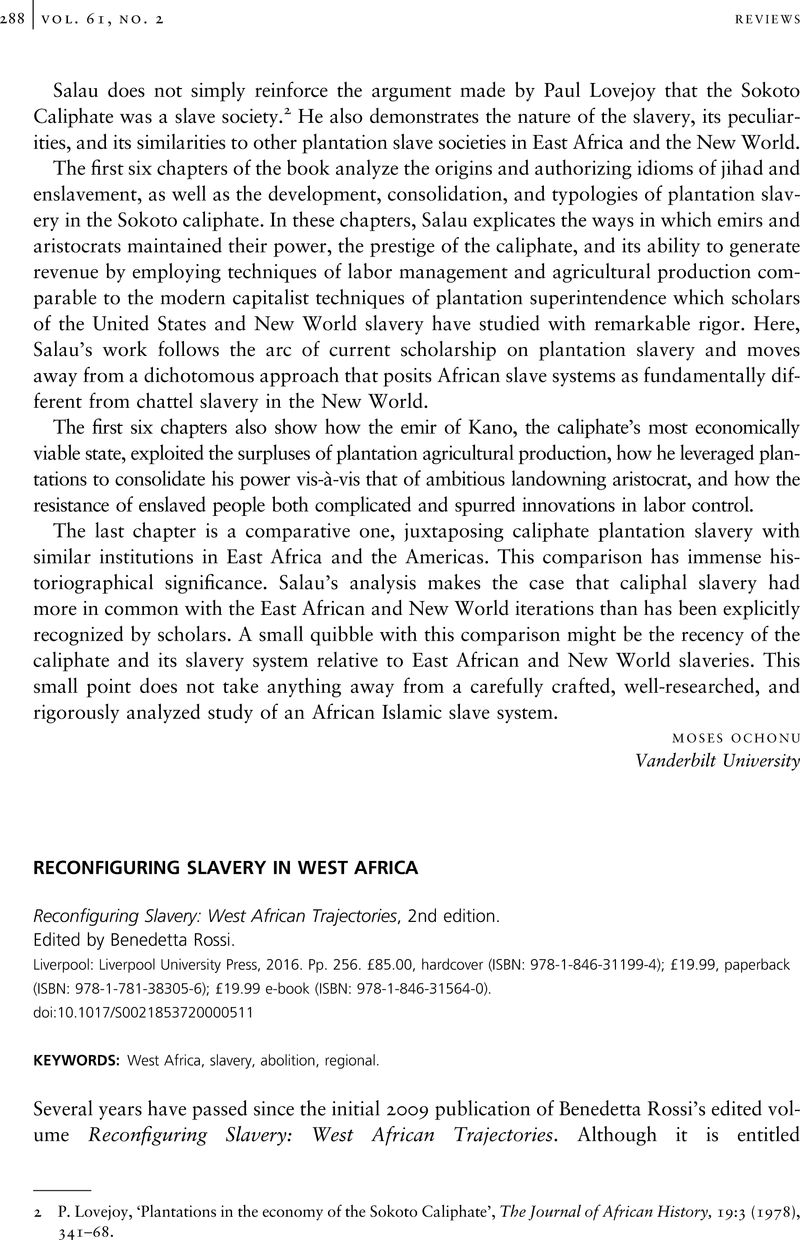No CrossRef data available.
Article contents
RECONFIGURING SLAVERY IN WEST AFRICA - Reconfiguring Slavery: West African Trajectories, 2nd edition. Edited by Benedetta Rossi. Liverpool: Liverpool University Press, 2016. Pp. 256. £85.00, hardcover (ISBN: 978-1-846-31199-4); £19.99, paperback (ISBN: 978-1-781-38305-6); £19.99 e-book (ISBN: 978-1-846-31564-0).
Review products
Published online by Cambridge University Press: 07 October 2020
Abstract

Keywords
- Type
- Reviews of Books
- Information
- Copyright
- Copyright © The Author(s), 2020. Published by Cambridge University Press
References
1 H. L. Gates Jr., ‘Preface’, in D. Eltis and P. Morgan (eds.), special issue ‘New Perspectives on the Transatlantic Slave Trade’, William and Mary Quarterly, 58:1 (2001), 3.
2 B. Holsey, Routes of Remembrance: Refashioning the Slave Trade in Ghana (Chicago, 2008), 122–3. See also S. Diouf, Fighting the Slave Trade: West African Strategies (Athens, OH, 2003), xiv.
3 S. Miers and I. Kopytoff, Slavery in Africa: Historical and Anthropological Perspectives (Madison, 1977); G. U. Nwokeji, The Slave Trade and Culture in the Bight of Biafra: An African Society in the Atlantic World (Cambridge, 2010); A. A. Perbi, A History of Indigenous Slavery in Ghana: From the 15th to the 19th Centuries (Accra, 2004); G. Midlo-Hall, Slavery and African Ethnicities in the Americas: Restoring the Links (Chapel Hill, NC, 2007); W. Hawthorne, From Africa to Brazil: Culture, Identity, and an Atlantic Slave Trade, 1600–1830 (Cambridge, 2010).
4 S. Drescher, Abolition: A History of Slavery and Antislavery (Cambridge, 2009).
5 H. B. Lovejoy et al., The Liberated Africans Project, (https://liberatedafricans.org).
6 A. Brivio, ‘“I am a slave not a wife”: slave women in post-proclamation Gold Coast (Ghana)’, Gender & History, 29:1 (2017), 31–47; C. Whyte, ‘“Everyone knows that laws bring the greatest benefits to mankind”: the global and local origins of anti-slavery in Abyssinia, 1880–1942’, Slavery & Abolition, 35:4 (2014), 652–69; A. McDougall, ‘Colonial labour, Tawdenni and “l'enfer du sel”: the struggle from slave to free labour in a Saharan salt mine’, Labor History, 58:2 (2017), 185–200.


